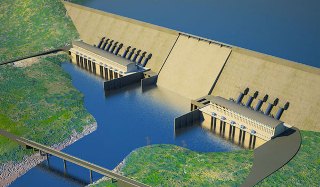Sudan downplays negative impact of Ethiopian dam project
May 30, 2013 (KHARTOUM) – The Sudanese government has declared that the Grand Ethiopian Renaissance Dam (GERD) does not pose a threat to Sudan, disclosing existence of consultations and understandings among Sudan, Ethiopia and Egypt on the project.

The foreign ministry spokesperson, Abu Bakr Al-Siddig, said on Wednesday that Sudan’s ambassador to Cairo didn’t describe the Ethiopian move to change the course of the river Nile as “shocking”, denying reports that Sudan and Egypt would resort to the Arab League.
Al-Siddig added that Sudan’s ministry of water resources and electricity has affirmed that the Ethiopian move doesn’t impose any threat to Sudan, asserting that Sudan is committed to cooperate with Ethiopia and Egypt on issues of the river Nile’s water to serve the common interests of the three countries.
Sudan’s embassy in Cairo, for its part, denied the statements attributed to ambassador by a correspondent of the Anadolu Agency, adding that they were made on May 23 which is prior to the Ethiopian decision to change the course of the river.
The embassy further said that Ambassador Ali focused in his statements on the permanent and continuous coordination between Sudan and Egypt over all water issues, and relations between the two countries and the Nile Basin countries.
In April 2011 Ethiopia launched construction of the $4.8 billion dam on the Blue Nile, at about 40 km east of Sudan in the Benishangul-Gumuz region.
On Tuesday, Ethiopia began changing the course of the river Nile. According to a Ethiopian government official the diversion would only cover “a few meters” after which the river will continue flowing on its natural course.
The chief executive officer of the state-run Ethiopian Electric Power Corporation, Mihret Debebe, explained that the “dam is being built in the middle of the river; hence construction work can’t be carried out while the river is flowing”.
The Ethiopian official further said that changing the course of the river “would allow us carry out civil engineering works without difficulty”.
The construction of the dam project on the Blue Nile led to outcry from the downstream countries of Sudan and Egypt; which had control over most of the water resources using a treaty signed during colonial era.
Some Egyptian news media have responded negatively to the Renaissance Dam and demanded sacking the minister of irrigation.
The head of the program on Sudan and Nile basin at Al-Ahram Center for Political and Strategic Studies (ACPSS) said the approval of the minister of irrigation for the construction of the dam reflects submission and negligence as well as ignorance of the strategic repercussions of the dam, calling for dismissal of the minister.
Egypt and Sudan had previously argued that the construction of the dam would negatively affect their water shares and insisted the project should be blocked, calling on international donors against funding it.
However Sudanese president Omer Al-Bashir announced his support to the project in March 2012, saying his government understands the mutual benefits the project could offer Ethiopia and Sudan.
Last Saturday, Egyptian minister of irrigation, Mohamed Baha Eddin, said his country is not opposed to the Ethiopian dam project as it does not impair Egypt’s interests.
He told reporters that the Ethiopian prime minister emphasised his country’s eagerness to prioritise Egypt’s interests above their own.
Ethiopia on 28 May held in Guba area in Benishangul-Gumuz state a ceremony to celebrate the successful diversion of the start of the construction of the Grand Ethiopian Renaissance Dam.
Speaking at the event, president of the GERD construction council and deputy prime minister Demeke Mekonnin said the diversion of the river has been successfully done to utilise the resource for the interest of Ethiopia and the neighbouring countries.
Ethiopia’s water and energy minister, Alemayehu Tegenu, also made some statements in the same direction stressing that the construction of the dam is being carried out in such a way that it maintains the mutual benefit of the Nile basin countries.
He underscored that the dam would enhance cooperation and economic integration and would not do any damage to the lower riparian countries.
(ST)
